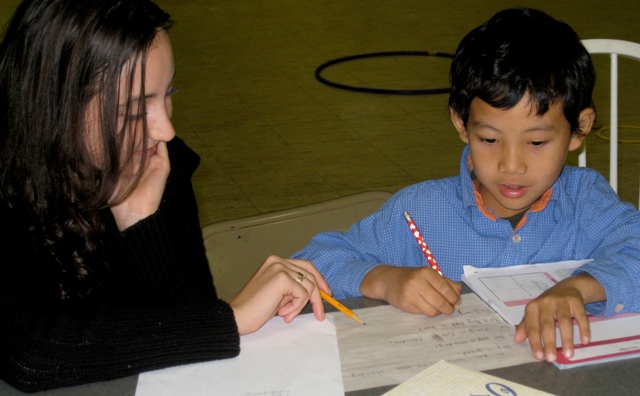GSN student helps refugees from Burma build lives in their new country

A driving lesson, a weaving group, a soccer game, a friend to take you grocery shopping or hold your baby while you study. These things and more are offered by the Worcester Refugee Assistance Project (WRAP) that is helping refugees from Burma assimilate to life in Central Massachusetts. Co-founded by nursing student Meredith Walsh and a handful of other committed volunteers, the fledgling organization is creating opportunities for refugees to learn from each other and from local volunteers, to share cultural traditions, to successfully navigate the complex health care and education systems—in short, to build a life in this country.
After graduating from Tulane with her master’s in public health and serving in the Peace Corps in the Philippines, Walsh spent four years in Thailand on the Burma border, first working in refugee camps, where she conducted health assessments for the American Refugee Committee (an international Non-Governmental Organization) and later at the world-renowned Mae Tao Clinic, where she worked in maternal and child health programming. While working in the clinic, she saw a way that she could have a greater impact.
“I came [to Worcester] because I needed clinical skills,” said Walsh. “Working in public health can be like looking at the forest and I wanted to be able to see the trees.” She enrolled in the Graduate School of Nursing’s Graduate Entry Pathway program so that she might someday return to a place like Thailand and offer more sustainable and far-reaching help. In the “teach a man to fish” tradition, Walsh said, “Ultimately I could go back to a setting similar to where I was working, perhaps training workers in a public health setting.”
Of the more than 2 million people who have fled Burma amidst the decades-long violent civil conflict, a handful—about 230—have resettled in the Worcester area, and new families arrive every few months. While studying nursing here, Walsh had a strong desire to continue to help the population she had come to know on the Thai-Burma border. Through word of mouth, she learned about a group of volunteers who were informally offering services to the local population from Burma. Joining them, she and her fellow volunteers formally founded WRAP a little more than a year ago and are working toward official status as a 501(c)(3) charitable organization. While all refugees have access to resettlement assistance from various federal programs, WRAP offers supplemental or “wrap-around” services that aren’t available elsewhere.

A cornerstone of the support that WRAP offers is a family-orientation program in which a refugee family is matched with a local volunteer who helps that family navigate day-to-day life in Worcester. Families get help with whatever they need—from going to the grocery store or visiting a park to scheduling a doctor’s appointment. So far, 12 matches have been made, with volu